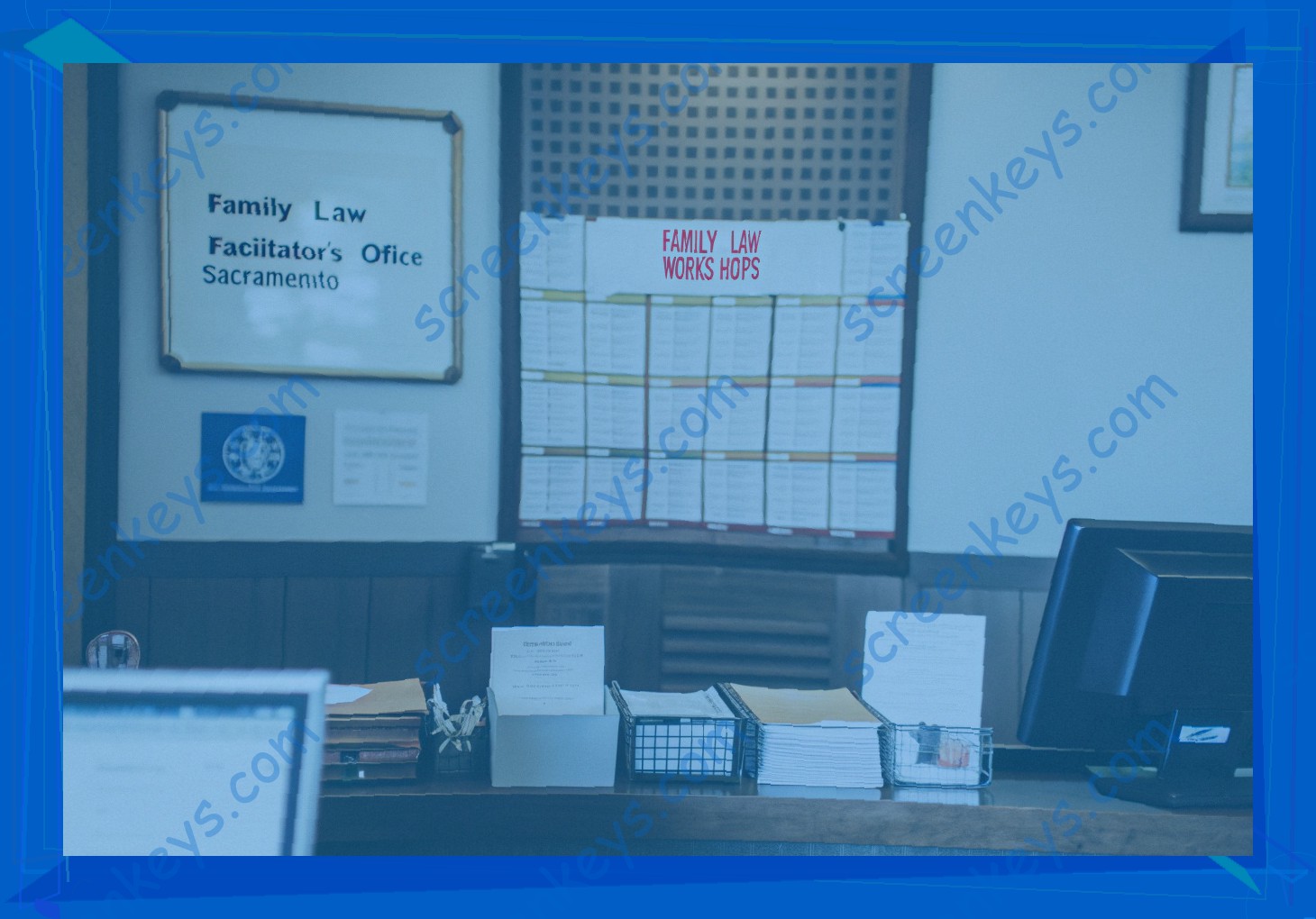What Exactly Does a Family Law Facilitator Do?
A family law facilitator in Sacramento is a trained member of the family court staff whose purpose is to assist the public with their questions regarding legal forms and court procedures. The family law facilitator in Sacramento, as in other California counties, is not permitted to give legal advice to pro per litigants. In almost all counties, depending on family law case filings, the family law facilitator may also conduct limited scope child, spousal, or partner support services in family court.
The family law facilitator in Sacramento County provides the following family court services: The family law facilitator is prohibited from providing legal advice to pro per litigants, which would include advising on the various issues before the family court, such as , property division; support awards; custody and parenting plans; and attorney’s fees/costs. Simply put, the family law facilitator in Sacramento County does not provide legal advice. However, the family law facilitator in Sacramento County will answer pro per questions about legal forms and court procedure; the family law facilitator cannot substitute for counsel, which includes the preparation and filing of pleadings, responses and declarations (under penalty of perjury). In addition, while the family law facilitator in Sacramento County will be of assistance, they cannot substitute for self-help centers where available. Generally speaking, self-help centers will assist in the following areas: legal information; forms assistance; and court forms and procedures.
What Services Do Family Law Facilitators Provide?
Family law facilitators in Sacramento offer a variety of services to those who are navigating the complexities of family law on their own. One of the most common services offered by family law facilitators is the preparation of legal paperwork. Litigants who wish to retain their own attorneys are not permitted to ask family law facilitators for legal advice but they can ask family law facilitators to prepare all of their legal forms for them. Alternatively, some facilitators only meet with litigants after attorneys have been retained and the preparer is able to assist with the drafting and filing of pleadings as needed. Family law facilitators also provide assistance with discovery. This includes providing explanations of the types of document requests that must be made, how to fill out forms such as the request for production, and how to respond to document requests. In Sacramento, there are also family law facilitators who hold workshops once a month where they explain the state of the law for the various issues frequently faced during family law proceedings. Each of these workshops is geared towards self-represented litigants and provides an opportunity to ask questions regarding each topic discussed. The current workshop schedule is: 1. Forms and Instructions: Monthly; 1st Thursday of each month – This workshop helps self-represented litigants learn about and understand how to complete the necessary court documents for divorce, separation, or legal annulment. 2. Child Custody & Visitation: Monthly; 2nd Thursday of each month – This workshop assists self-represented litigants in understanding their legal obligations regarding custody and visitation of their children and provides relevant procedures. 3. Child Support: Monthly; 3rd Thursday of each month – This workshop provides self-represented litigants with information about their legal responsibilities regarding child support. It explains the legal process by which the courts determine how much child support must be paid. The featured guest speaker is a family law attorney who assists with child support, so participants can receive answers to their questions. 4. Spousal Support: Monthly; 4th Thursday of each month – This workshop educates self-represented litigants about their legal responsibilities regarding spousal support (also known as alimony). It explains the legal process judges use to determine how much spousal support must be paid and helps litigants prepare financial information to support the hearing. Lawyers from the Family Law Section of the Sacramento Bar Association are available to answer individual questions. 5. Financial Disclosure Calculators (Dissomaster): Monthly; 2nd Friday of each month – This workshop focuses on teaching self-represented litigants how to use a calculator called the Dissomaster. The calculator is used by the courts to calculate child support and spousal support amounts using information provided by each spouse. Once you know the amount of support that will be paid/received, you can determine whether a spousal support order conforms to the Dissomaster guidelines or whether it’s too high/low and needs to be modified. Each of the workshops held by family law facilitators in Sacramento is free of charge and no reservations are required. Attendees are encouraged to call the day prior or morning of to confirm that the workshop is occurring as scheduled.
How Can I Find a Family Law Facilitator in Sacramento?
There are multiple ways to access the services of a family law facilitator depending on your needs and the resources available to you.
Placer County:
In Placer County, the Family Law Facilitator is located at the Family Relations Division at the Superior Court of California, County of Placer, Hall of Justice, 10820 Justice Center Drive, Suite 240, Roseville, CA 95678. The Family Law Facilitator can help you with "do-it-yourself" court forms such as: Request to Waive Court Fees (Form Fee Waiver), Motion to Waive Court Fees (Fee Waiver), Petition to Establish Parental Relationship (Espousal Support), Response to Establish Parental Relationship (Petition for Dissolution of Marriage), Response to Petition for Dissolution of Marriage (Family Law Response), Motion to Waive Court Fees (Fee Waiver), Notice of Motion and Motion, Declaration and Supporting Memorandum of Points & Authorities, Order (form only – completed by judge), Income and Expense Declaration, Request for Order (RFO) (Family Law), and Blank RFO Forms. A few other important forms that meet the requirements for use in Placer County, California include: Guidelines for Child Support Calculation, Procedures for Child Support Calculation, Child Support Collection & Disbursement (Controlled Assets), Child Support Collection & Disbursement (Post Judgment), and Chart of Child Support Guidelines. Mediators, Paralegals, and other court staff will not assist you in filling out any court forms or with your legal questions. Appointments are available on a walk-in basis only! All clarifications or corrections of the documents must be written by the customer with the staff at the front counter.
Sutter County:
Sutter County has locations in both Yuba City and Live Oak. The family law facilitator is located at 463 Second St., Suite 309, Yuba City, CA 95991-5850, phone (530) 822-7273. The family law facilitator can also field requests to meet from the public during one day a week in their Live Oak location, 4446 Oak Ave., Suite F., Live Oak, CA 95953, phone (530) 822-7274. This location is not available to everyone and is by appointment only. Persons living in Yuba City, Live Oak and Wheatland should call to see if they qualify. Our office cannot take voice mail since we are so busy.
Nevada County:
The office of the family law facilitator in Nevada County is located in the courthouse at 201 Church St., Rm. 14, Nevada City, CA. The hours are Monday through Thursday from 9:30 a.m. to 12 p.m. and 1:30 p.m. to 4:30 p.m., except legal holidays. The office of the family law facilitator in Nevada County provides free assistance in filling out family law forms and how to file those forms with the court. The family law facilitator will also discuss general information about family law procedures and calculation of child support. However, they will not give legal advice, and they will not act as a party’s attorney in any proceeding, nor will they represent parties in court.
Tehama County:
The Office of Family Law Facilitator is located at 633 Washington St., Suite E, Red Bluff, CA. The office hours are Monday through Friday from 8:00 am to noon and Mondays, Tuesdays, and Thursdays from 1 – 5 pm.
Common Matters Handled by Family Law Facilitators
Family law facilitators in Sacramento assist with a wide variety of issues. A few they assist with include:
Divorce
If it’s time to file for divorce in Sacramento, a family law facilitator can help. While they cannot give legal advice, they can help you understand the process and what forms to fill out. In addition, they can assist you in negotiating a settlement. However, for everything else (like filing with the court, going to court, serving papers, etc.) you will need an attorney to represent you.
Child Custody
If you have children and are going through a divorce or separation, a family law facilitator can help you answer questions about the process. The process does vary by county, so check with a family law facilitator in your area. However, most of the time, the facilitator can show you concept custody agreements (for example, visitation) and how they work. They may also be able to help you find information on child custody evaluations (usually when a custody battle is more complicated) if necessary.
Child Support
Involving both parents can get tricky when you’re trying to determine child support. A family law facilitator will typically recommend that both parents provide the guideline amount, but ultimately leave the decision up to the court. If a parent doesn’t earn enough to support the child (on their own), the court can essentially dispense different amounts of support from each parent so that the child receives the proper assistance.
The Advantages of Speaking With a Family Law Facilitator
One of the most important resources available to individuals dealing with a legal dispute involving children is our Family Law Facilitator and his staff. These highly knowledgeable professionals can provide a variety of assistance to individuals seeking information about family law and domestic relations issues. They can advise you about the process, assist with filling out court forms, provide referrals to other services as needed, and answer legal questions. The following is an excerpt from the Department of HR staff evaluation of the Facilitator’s services in 2005: [He] provided the following assistance: (1) reviewed cases with a legal custodian in order to prepare for a Contempt Hearing; (2) prepared pleadings and declaration in order to assist a self-represented party to request modification of existing child custody/visitation orders; (3) assisted a self-represented party to prepare for a Family Law Legal Orientation Clinic ("FLOC"); (4) explained the law to a non-custodial parent seeking mediation; (5) reviewed a non-custodial parent’s mediation order with him; (6) referred a self-represented party who had moved out of the area to other family law facilitators in the county who could assist him. [He] provided quality services. Her communication skills are exceptional . . . , and she treats her clients with a great deal of respect. For example . . ., she made herself available for a FLOC appointment at 8:30 a.m. so the parties would not have to delay their proceeding by having to wait for an 11:00 appointment. In another case, [he] took the time to explain to a party just prior to his Contempt Hearing the purpose of the proceeding, the likely outcome, and the terms of a proposed settlement. The Family Law Facilitator is a very special and cost-effective service provided to the people of Sacramento County. The Sacramento (County) Family Law Facilitator has made excellent recommendations to be more efficient and cost-effective in helping people understand the system and to help them save on legal fees through the use of his program. I highly commend him and his staff . . . .
Family Law Facilitator: What Are Their Limitations?
As mentioned above, family law facilitators are available to assist the unrepresented parties in a family law action. However, they cannot effectively represent both parties and hold the interest of both parties as confidences. This situation creates a conflict of interest and the family law facilitator cannot represent the party(s) at trial. Family law facilitators can only assist in court through settlement conferences in order to see if the parties can reach their own agreement as to child custody share, visitation, and dividing up community property.
Family law facilitators can review your case and provide legal information on what is required in all cases. They can give you information on court procedure and family law, such as the effect of the presumption that you share child custody unless the other party has qualified for the Family Code 3044 [domestic violence/abuse provisions]. The family law facilitator cannot tell you how your specific case would be addressed in court or give you legal advice. It would be like asking someone to invest in the stock market without knowing which stocks yield the most return now, or in the future. The family law facilitator working at the Sacramento Family Law Courthouse cannot get you ready to litigate at trial. If you are going to trial (particularly concerning child custody and visitation), you should consult with a family law attorney about your case. Family law facilitators can *not* provide legal advice to pro se litigants.
Family Law Facitiltor FAQ
Who is eligible to receive the services of a family law facilitator?
The Family Law Facilitator may assist any individual seeking help on a family law case. There is no restriction on the income level of the person requesting assistance from the Family Law Facilitator. If the client would like to have a private retainer attorney assist them through a family law proceeding, the retainer attorney would be able to assist them in a more extensive and private manner.
What does it cost?
Services of the Family Law Facilitator are provided free of charge to the general public.
Are the Family Law Facilitators attorneys?
The Family Law Facilitators are generally attorneys who are hired by the Department of Child Support Services (DCSS) to assist individuals in family law proceedings with a focus on self-represented or low income individuals.
I already have a private attorney, can I still work with the Family Law Facilitator?
Yes. While the Family Law Facilitator assists individuals without regard to income level , if the person already has a private retainer attorney it may be harder to schedule an appointment with the Family Law Facilitator since the family law facilitator needs to avoid any conflicts of interest to ensure that services can be provided to any person in need. Therefore, it is recommended that if you have a private attorney you work with your private attorney and not see the Family Law Facilitator.
How does the role of the Family Law Facilitator differ from a private attorney?
A Family Law Facilitator specializes in helping self-represented litigants with their family law issues. The Facilitator is familiar with the family law forms and can explain the general process of going through a divorce, child custody, child support or spousal support case in Sacramento. The Family Law Facilitator’s role is to provide unbundled services, or limited scope legal assistance, to parties who have family law matters. However, the Facilitator may not represent the parties in the litigation process. A private attorney may provide legal services for all aspects of the case.




